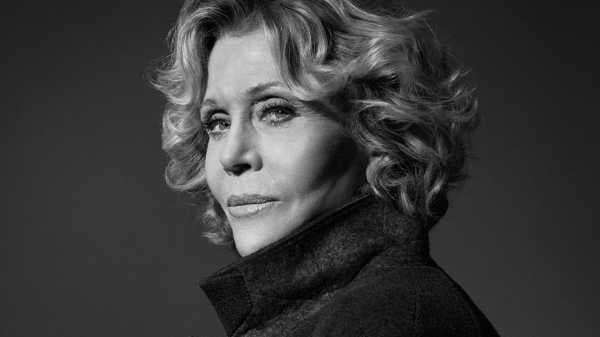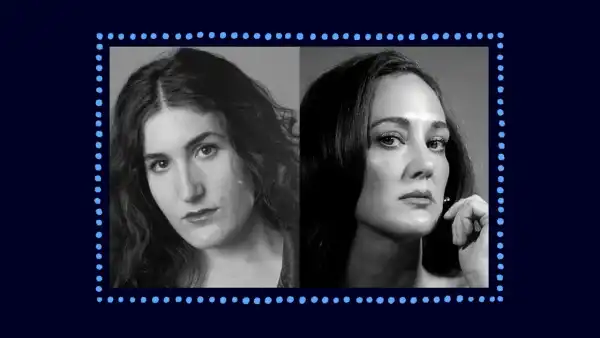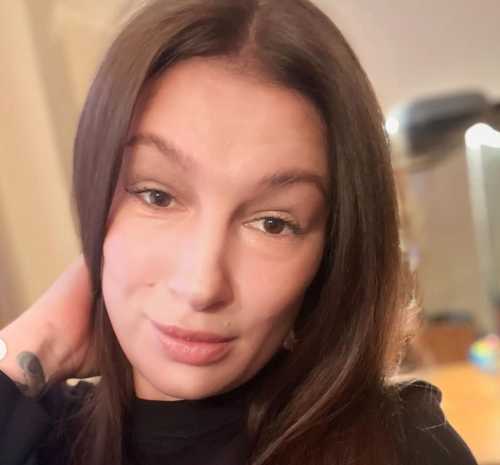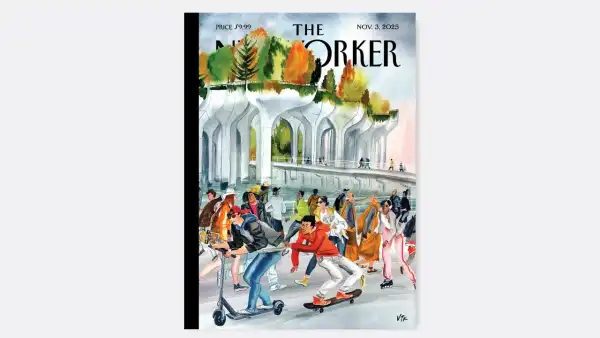
The first four acts in Susan Lacy’s new HBO documentary, “Jane Fonda in Five Acts,” are named after men: Fonda’s father, Henry; her first husband, the French auteur Roger Vadim, who directed her in “Barbarella”; her second husband, the antiwar activist and author Tom Hayden; and her third husband, the media mogul Ted Turner. The last act is called “Jane Fonda.” The story that the movie tells is largely about how Fonda, despite her outspokenness, took a lifetime to live on her own terms.
Last Friday, Fonda, who turned eighty in December, was sitting in a publicity office, wearing mod-ish pants, a black turtleneck, and a chain necklace that she occasionally fondled. When I arrived, she was scrolling through her phone, reading breaking news. “Did you just hear that Rod Rosenstein once proposed secretly taping President Trump and removing him via the Twenty-fifth Amendment?” she said. “That’s not going to help.” When I asked what we do if Trump fires Rosenstein or Robert Mueller, she said, “We take to the streets. We pour into the streets and we protest like never before.” The Jane Fonda Experience had begun.
This interview has been edited and condensed.
You’ve put so much of your life into the public arena—your mother dying by suicide when you were twelve, eating disorders, your marriages. Is there a psychic cost to making everything so public?
The only problem is the one that—“Nanette.” What is her name? That great standup comedian?
Hannah Gadsby?
Hannah Gadsby articulated it far better than I can: when you have developed a public narrative of your life that you keep repeating over and over again, it can become difficult, then, to go deeper for yourself. So I think that’s the danger. Can that be called a psychic cost? I’m not sure.
Is there a part of you, after all these years in the spotlight, that you keep for yourself? A private core?
Well, I’m still trying to totally understand the private core. I mean, I’m a seeker. I’m really, really curious. What is real? What is true? Who am I? Like, I don’t know if I’m a narcissist or not. I’d like to know!
I’m sure people have accused you of being a narcissist.
Oh, yeah. My granddaughter. [Laughs.]
There was a surreal element to your childhood in Hollywood. Jimmy Stewart was your Santa Claus every Christmas, and you found out about your mother’s suicide from a movie magazine. How did you navigate what was real and what wasn’t?
Well, I’m extremely resilient. Resilience is a really interesting thing. A therapist I had once said she can tell when someone walks in the room if they’re resilient. It means that no matter what happens to you—short of really profound trauma—you’re always scanning the horizon looking for a warm body that can take you in and love you and teach you. And some people can be right in front of a warm body that can do that, and they can’t metabolize it. They can’t let them in. But I am able.
Every time I’m talking, there’s a half of my brain that’s thinking, “Why are you even saying this? You’ve had it so easy.” I’m really aware of how, if the things that I’ve done had been done by a black woman, I’d probably be dead. I’m aware of that.
Your father, Henry Fonda, was very critical of your body when you were young, and I’m sure that had a lot to do with your struggle with eating disorders. Did you ever get to talk to him about it?
No, no.
Were you able to forgive him?
Totally. If you go back and you really try to understand who your parents were, and their parents, you’ll probably end up finding out that they had issues, that what they did was the behavior of someone that has wounds. And when you understand that you can’t help but forgive them, and yourself. It wasn’t that I didn’t deserve their love—it’s that they had been damaged and just weren’t capable.
You say in the film, “I always saw my mother as a victim. Woman equals victim.” What was she a victim of?
[Sighs.] I can’t—my brother doesn’t want me talking about it, so I can’t really answer it. I can only tell you that as a young girl she was traumatized. And I know this because I got her medical records, in which she wrote her little life history.
“ Queen Jane, Approximately”
Read Hilton Als’s 2011 Profile of Jane Fonda.
Until I found that out, I didn’t want anything to do with her. It’s why I never went to her grave. But, once I found out what she had been through, all the pieces of the puzzle fell into place, and I gained agency over my life. I was a child when she died, so, even if I had known, I had no way of really being able to help her heal. All I knew was that she’s not all there, and Dad doesn’t really love her, and I don’t want anything to do with her. He’s the one that’s going to survive. It was hard for me to then start to understand women, and love women, and make friends with women.
This reminds me of Christine Blasey Ford. I’ve seen a lot of women talk about how it’s been triggering to see someone carry trauma for years and then be attacked in public. Has the story resonated with you in that way?
Oh, God, yes. I mean, when people say, “Why did she wait so long?”—because that’s what people who’ve been traumatized do. A lot of it has to do with carrying guilt, and, the younger they are when it happens, the more guilt they carry. And sometimes it’s so bad that they just bury it, or they think, “This is just normal.” The ability to trust, the ability to really be relational, is so severely wounded that it needs a certain kind of process to heal. I totally understand why women are triggered by Dr. Ford—and, starting with the Trump election, why women are triggered. Now, we have to understand, he’s been traumatized, too.
Brett Kavanaugh?
No, Trump! Trump is a man who was profoundly traumatized as a child by his father and not protected by his mother, and it must have been really bad. And we are reaping the results of that early trauma.
You’ve said that “we have to love” Donald Trump. But he’s called you “disgusting” on Twitter. How do you manage that?
Well, I don’t like him. I’m making the distinction that Martin Luther King did: you don’t have to like them, but you have to love them. Because, if we carry hate, we’re the losers. We have to understand where the behavior comes from. Let’s not enable her or him, but let’s not hate him, because it steals something from your own soul.
In an interview you gave in 2006, you said that you didn’t want to speak out about the Iraq War, because you thought you would be a distraction. Do you no longer feel that way?
I’m speaking more about domestic issues now, and the climate, which is a global issue.
What changed?
Well, I’ve changed. I’m getting old, I’m going to die soon, and I have strong feelings, and I think that these things need to be said. And so I’m going to say them.
We live in a very polarized environment, where celebrities speaking out can be ostracized. And you’re sort of Patient Zero for that. Do you feel like you’ve been here before, and you know what it’s like?
People came after me, but they didn’t stop me. Now, I recognize that part of it has to do with who I am, and who my father is, and my race. But I’m still going. And what I’m interested in is helping people understand the importance of talking to people who don’t agree with you. Empathy is radical in this kind of environment. We’ve got to understand why people voted the way they did.
Yes, there are some people—don’t even bother. They are dyed-in-the-wool white supremacists. Who knows what their wounds were? I don’t hate them for it, but I’m not going to waste my time. But there’s a whole lot of people in the middle of this country who are so scared and in such pain, because they feel betrayed. As well they should! Nobody’s been paying attention to them. That’s when you begin to learn: you talk to them. That’s why I’ve been spending so much time in Michigan. What do you really care about? What are the issues? Always, Fox is playing in the living room, so you know what they haven’t heard. And sometimes it’s, like, “Really? Oh, my God, I didn’t know that.”
Do you find that people come to you with this image of liberal Jane Fonda? Does it still alienate people?
I’m sure. I haven’t run into it when I canvass and knock on people’s doors. No one has slammed the door in my face.
What do they say when Jane Fonda knocks on their door?
Well, they don’t always know who I am. But you can learn a lot at the door. It’s what the right wing has been doing for decades. It’s why we lost the state legislatures and the gubernatorial races and the down-tickets. It’s because they’ve been on the ground, because they know what’s important.
Speaking of reaching out to people on the other side of the political divide: you made “Coming Home” with Jon Voight, a film that was passionately antiwar. What do you make of his politics these days?
I don’t know. I don’t understand it. I have no idea.
When was the last time you talked to him?
Years ago.
Do you think it would be possible to open up a dialogue with someone like him?
I mean, Jon used to be my best friend in Hollywood. He used to help me and Tom Hayden get people to look at the slideshows about the war and the Pentagon Papers. He was right there in the trenches. He’s not the only one. There are others—the writer Peter Collier, for example. Everybody has their own reasons. I’d rather talk to people in Pennsylvania, Ohio, and Michigan, those kind of places.
But some of those people share Jon Voight’s views.
Yeah, but I would rather talk to them than try to persuade Jon Voight of changing his mind.
At the Emmys last year, you came out with Lily Tomlin and Dolly Parton, and you and Lily joked about Trump being like the boss played by Dabney Coleman in your workplace-harassment movie “9 to 5”—
Although I never said Trump’s name.
And Dolly seemed to be on a different page. Do you talk to her about politics?
No. Dolly is a person of heart and spirit. She’s not a political person, but we need more like her. She is profound and she has a really, really huge heart, and she’s really smart and deeply spiritual.
When “9 to 5” came out, do you remember how men reacted to it, versus women?
I don’t. No! It’s a good question. We’re working on a sequel. And we’ve discovered that a lot of the young-women office workers haven’t seen “9 to 5.” My colleagues who started the “9 to 5” movement, in D.C. and in Milwaukee, are going to have some groups watch it and then talk about what seems outdated, what resonates. I’ve been spending a lot of time working on One Fair Wage for restaurant workers in Michigan and elsewhere, and one of the things that I think we’re going to have to get into this new movie—if it ever gets that far [knocks on wood]—is that a lot of people now who work full time live below the poverty line. They’re not as well off as Judy Bernly and Doralee and Violet were back then. Partly, it’s that they’re subcontracted to companies. They don’t even really work for the companies, so they don’t have any place to go for wage theft or whatever. They don’t get health care. It’s really bad.
You studied early on with Lee Strasberg, who brought the Stanislavski method to America. Are there things that you learned in that class that you still use?
Mainly the importance of relaxing. I just finished Sally Field’s book, which is really good—“In Pieces,” it’s called. She also studied with Lee, but much more in depth. I think he gave me the courage to go into it as a profession. I can’t say that I knew how to apply what he said to my work, but I learned the hard way that relaxation is really important.
Did you use things like emotional recall? Your movies have had some very personal moments: obviously, the scenes with your father in “On Golden Pond,” but also, I’d imagine, the suicidal despair in “They Shoot Horses, Don’t They?” Do you pull things from your own life in a Method-acting sort of way?
Kind of, yeah. The goal is to try to understand the woman that you are portraying so granularly that you’re looking at the world through her eyes. Can I say that that has happened a lot? No, it hasn’t. Just a few times.
Which times?
Oftentimes during “Klute,” for example, a few times in “Coming Home”—the two films that I’ve won an Oscar for. A few times in “Book Club,” strangely enough. A few times in “Our Souls at Night,” recently.
You’ve said that you noticed your voice dropped during “Klute.” Why do you think that was?
Because I was starting to be an embodied person. I spent a whole lot of my life disembodied, trying to please men. Because if a man—especially a fascinating man, who knows what he’s doing and where he’s going—oh, my God, if he loves me, it means I’m worth something. Which means that I wasn’t really in my body. I wasn’t in my skin. It was all about pleasing. Starting with “Klute,” I began to re-inhabit myself, and my voice began to drop. Carol Gilligan wrote a book called “In a Different Voice,” and when I read that I went back and looked at all my movies, and I could see my voice, which used to be way up here, start to drop as I started to get agency over my life.
Talking about #MeToo, you’ve said, “I never thought I would live to see this happen.” But why is that? Why didn’t this happen during the height of the second-wave feminism of the seventies?
I think Trump has something to do with it. We talked about triggering. Even before he was elected, when the tapes came out and we heard him saying what he said, I think it triggered a lot of women in a very traumatic way. They now had this back in their bodies. The memories were there. And then, because the women who came forward were white, and they were famous, and they were accusing men who were famous, it blew up. African-American women have been saying these things, most notably Anita Hill, for decades. But they weren’t famous white women, and the accused wasn’t a famous white man. And so that’s why I think it just exploded. And it keeps going, because the behavior is so epidemic.
Your three husbands were radically different from one another: the French auteur Roger Vadim, the crunchy radical activist Tom Hayden, the media mogul Ted Turner.
Buccaneer!
Do they have anything in common?
Oh, yes! The three of them and me, we’re all challenged in the area of intimacy. I sometimes think, Did the perfect man for me come along and I ran away scared? Because he would have said [bangs the couch], “Show up, Fonda. Come on, show up.” But, if you are dealing with issues and addictions, you’re not going to do that.
But your life also changed dramatically with each of these marriages.
Well, all of them had a totally different narrative. I didn’t realize what it meant to be an American until I lived in France [with Vadim], and I really lived in France. And, because I was immersed, I realized how different I was. I was acutely aware that, if you were born into a certain class in Europe, it was hard to get out. Whereas, back then, in the fifties and the early sixties in America, you could pull yourself up—Horatio Alger. It’s not true anymore in America, but it was then.
And then Tom—I needed someone far wiser and more knowledgeable than I was about movement-building and politics and all of that. And he had this depth of knowledge, and he gave me structure and guidance, and I learned so much from him that I am forever grateful for. I miss him so much.
There’s this crazy part of your biography where you, Tom, and your kids were living in what your father called a shack, in Santa Monica, and you were sleeping on a mattress on the floor.
Yeah, I had no dishwasher. I had no washing machine. I wanted to prove, to Tom and to myself, that I could do that, that I didn’t need to live with privilege. It was red-lined where we lived, it was thrift shops and bars and laundromats. My kids were never happier than they were there. But then he fell in love with somebody, and it really devastated me. And I’m glad that happened, too, because you think you’re broken, but you’re really broken open. That’s what broke me open, was that nervous breakdown. And then along comes Ted Turner, and he swept me up, which he can do so well. And what a great ten years. Again, I learned so much: about the corporate world, about the media world, and about nature.
When you started going out with Ted Turner, did your activist friends feel like it was a betrayal?
Not the ones that I’m close to and that really knew me, because then they got to know Ted. And they realized, in his heart of hearts, Ted is not some billionaire mogul. He’s a totally brilliant, visionary, hysterically funny, wounded child.
Do you ever think about what would have happened if you hadn’t split up?
“ The Lost Tycoon”
Read Ken Auletta’s 2001 Profile of Ted Turner.
Oh, I do, all the time, yeah. He and I talk about it together. And it was really hard to leave—I was sixty-two years old and I had no career anymore. I didn’t have to work, I was being looked after. And yet I knew that, if I stayed, I was never going to become who I’m meant to be as a whole person, as a really authentic person. And I tried to explain it to him, but he doesn’t really understand.
Still?
No. No, unfortunately.
Does he want to get back together?
You’d have to ask him. But can’t you tell by looking at the movie?
You tell this story of your first date with Ted, how he bragged about how he went through the CNN archives and had a stack for you and for him.
Mine was this big, but his was that big!
That seems sort of Trumpian to me.
There’s a certain—yeah. Ted was also traumatized as a young boy. When Ted first told me his story, I remember him looking at me and he said, “Why are you crying?” And I said, “Why are you not crying?” And, because I knew that about him, I could forgive so much. Alice Miller writes a lot about it in books like “The Drama of the Gifted Child.” And then another line, which is like a mantra of Ted’s: “It was for my own good. He was my best friend. It was for my own good.” [Sighs.] Father!
I want to ask you about the workout tape. The Washington Post wrote about you, in 1985, “She is a lightning rod for a generation whose rhetoric has evolved from Burn, Baby, Burn to Feel the Burn.” Do you think that’s a fair assessment?
The workout—first of all, because it funded a statewide organization for economic democracy in California—was well worth it. But also it changed a lot of women’s lives for the better. One of my favorite letters, and I got thousands and thousands, was from a woman who said, “I was brushing my teeth today, and I saw this muscle in my arm that I’d never had before.” And she said, “I was so excited, and when I walked into my office I stood up to my boss for the first time in my life.” It’s when you move back into your body, and you own your body: I’m here. Deal with it. Made a huge difference to women.
Tom hated it. Even though all money went to the organization. He thought it was all about vanity. It was so much more than that.
Was there an issue around you being more famous and making more money than him?
I think it’s very hard for men in this patriarchal culture to be married to someone—I mean, Tom was a great writer. He wrote I don’t know how many books. Then I go and write “Jane Fonda’s Workout Book,” and it’s No. 1 on the New York Times for two years. But he framed it and gave it to me, signed it, “Congratulations, baby.” Which was really, really nice of him. I’m sure it must have been very hard for him.
Do you think workout culture now has created an unrealistic standard for perfection?
I don’t like that part. I think it’s great that people are working out. Especially now that I’m old. What a difference it makes. But when it becomes obsessive—and I can say this from experience, because it was with me—then it’s not good.
The documentary includes an archival clip from a talk show from decades ago, where you say, “Any healthy country, like any healthy individual, should be in perpetual revolution, perpetual change.” Is that how you see yourself?
I didn’t even know what revolution meant when I said that. I wouldn’t say that now. When Ted and I split up, I said to him, “I’ve changed.” And he said, “You’re not supposed to change after sixty.” And I said, “I think you’re in trouble when you don’t keep changing.” I moved into my daughter’s house, and it was pretty shocking going from twenty-three kingdom-sized properties and a jet plane to a really quiet, small house in a not-gentrified part of Atlanta. Me and my golden retriever. And I remember standing in the middle of the room, and I felt so sad. But then I realized, I’m O.K. I don’t need a man to define me anymore. And I could feel myself moving back into myself. And I knew that that was God. Whatever God is, I knew, this is what is supposed to happen.
We’re supposed to be whole. I used to be bothered by the fact that in the Bible, in the Book of Matthew, Jesus is quoted as saying to his disciples, “You must be perfect, as our Father is perfect.” But it’s a mistranslation of the Aramaic. What he really said is, “You must be whole, as our Father is whole.” What does it mean? It means your oars are in the water. You’re steering your craft, against the tide, trying to be what you were meant to be before you die. So when you get to the end, you know you did your best.
Sourse: newyorker.com






